June 2020: Olive Tree

Volume V/Issue 3/June 2020


From The Editorial Desk
The Sacred, Meek And Humble Heart Of Jesus
"Take up my yoke upon you, and learn of me, because I am meek, and humble of heart" (Matthew 11:29). Jesus told us to learn two things from Him - humility and meekness. Generally speaking, many have spoken and written about the humility of Christ. But not much is written or spoken about the the meekness or gentleness of Christ. This has led to an imbalance in the personal lives of many believers and also in the Church.
We see Christ's severity in the way He rebuked the Pharisees (Matthew 23) and Peter (Matthew 16:23), and in the way He turned over the tables of the money changers and drove them out of the temple (John.2:14-16). That represented one aspect of God's nature that the Sacred Heart of Jesus Manifested.
But we also see the gentleness of God was manifested by the Sacred Heart in the way Jesus dealt with notorious sinners. We see something of the gentleness of Jesus in the way He spoke to the woman of Samaria, for example. Jesus had asked her about her husband. The woman immediately changed the subject and asked Jesus a totally unrelated question about worship (John.4:17-24). And we see there that Jesus did not press the issue of her immoral past, but allowed her to change the subject, and answered her question about worship. If we embarrass another person by probing curiously into details about their past life, or by repeating things that touch sore points in their life, we can be certain that we have learned NOTHING of the gentleness of Christ Sacred Heart from the Holy Spirit.
Curiosity is a sin that even many believers have not recognized as a demonic vice. Our flesh has a great longing to know about the evils that others have done, and so will always be desirous of listening to the sins of others, even when they are shared under the pretext of being prayer- requests. Such information however will never do us any good, but on the contrary will pollute our minds, prejudice us against others, make us evil, and hinder our witness and our ministry for the Lord. That is how Satan leads many believers astray.
A gentle person will always be cautious never to say anything that will probe curiously into the private areas of another's life or into his past. If we accidentally touch someone at a sore point, and see the person's discomfort, we should be quick to change the subject and act as though we know nothing. That is gentleness.
We see the gentleness of Jesus' Sacred Heart also in the way He dealt with the woman caught in adultery (John.8:1-12). Jesus certainly did not condone her sin or call her sin by some other name. He called her adultery 'sin' and told her very clearly that she must not commit sin again. But He did not throw stones at her for being sinful. God does not throw stones at sinners. We must never forget that. There are two ways to preach about victory over sin. One is the way Jesus preached it, without throwing stones at people. The other is the way the Pharisees preached it, by condemning people. The gentleness of Christ is missing in the words of many who preach on victory over sin. They tell others not to sin, but they also criticize them, accuse them and refer to them by hard names. The Pharisees were like that. They preached about righteousness, but they considered everyone "accursed" who did not belong to their group (John.7:49). We find the same attitude in many believers today.
Jesus on the other hand, preached a much higher standard of righteousness than the Pharisees ever did. But He never called any sinner by bad names. He loved them and won them to a godly life, through His gentleness. The woman caught in adultery realized that while the Pharisees had come only to point out her sin and to accuse her and expose her, Jesus wanted to save her. And she must certainly have been saved and become one of Jesus' disciples, after that encounter with Him. When Jesus preached to that sinful woman, He did not preach doctrine to her, but encouragement. He came with a message of salvation from the power of sin, and not just with a doctrine on holiness. A lot of today's "holiness- preaching" however majors on doctrines that define the old man and the flesh, and the new and living way through the flesh etc., But rarely do we see the gentleness of Jesus' Heart in those who preach these profound truths. And so sinners are not attracted to such Pharisees, as they were attracted to Jesus.
This is where all of us who preach holiness would do well to examine our own lives and see how our message comes across to others. Is the gentleness of Christ Sacred heart present in our ministry? His Heart must be manifested in our flesh, if others are to be drawn to Him. We must allow the Holy Spirit to show us the gentleness of the Sacred Heart of Jesus, and to transform our hearts into that likeness if we are to fulfill Gods will for our lives.
How Can We Solve the World's Problems

There are many problems in the world today. Several Scriptures come to mind.I Timothy 4:1-3: "Now the Spirit manifestly saith, that in the last times some shall depart from the faith, giving heed to spirits of error, and doctrines of devils, speaking lies in hypocrisy, and having their conscience seared, forbidding to marry, to abstain from meats, which God hath created to be received with thanksgiving by the faithful, and by them that have known the truth."
II Timothy 3:1-5: "Know also this, that, in the last days, shall come dangerous times. Men shall be lovers of themselves, covetous, haughty, proud, blasphemers, disobedient to parents, ungrateful, wicked, without affection, without peace, slanderers, incontinent, unmerciful, without kindness, traitors, stubborn, puffed up, and lovers of pleasures more than of God: having an appearance indeed of godliness, but denying the power thereof. Now these avoid."
The first thing we can do is not be like these people. We need to take Sacred Scripture to heart and live by it.
Many today are wanting to use the same methods evil used to promote chaos and weaken our laws to eventually promote evil. In the 1960's there were protests and from 1965 to 1968, riots. One of the things desired was civil rights for minorities. True there were real evils to be addressed, but this was not the right way. Unfortunately civil rights has been used far more recently to promote the evil of calling sin a form of 'marriage'. The Pro-Life movement began using protests against the Anti-Life movement, which was promoting abortion. Although some now pray Rosaries in front of abortion clinics, no one is advocating true reform of our own lives through prayer and repentance. The best way to stop sin around us is to begin by heeding the advice, "go now and sin no more." (John 5:14 and 8:11)
Good uses different weapons from evil. These begin with heeding the advice of Saint John the Baptist: "Do penance: for the kingdom of heaven is at hand." The Douay-Rheims notes: ""Do penance": Paenitentiam agite. Which word, according to the use of the scriptures and the holy fathers, does not only signify repentance and amendment of life, but also punishing past sins by fasting, and such like penitential exercises." Good knows that evil flows from sin, therefore good begins by removing sin from their own lives first.
Good also knows that the only real solution to the world's problems is a universal conversion. And so good seeks to preach the Gospel and conversion by living the Gospel and conversion. Good knows that good example preaches much more than mere words ever can. In fact, good knows that preaching without living is worse than worthless. "This people honoureth me with their lips: but their heart is far from me." (Matthew 15:8) To have any hope of seeing people change their hearts, one must first have their own heart right with God. Without this, we are not truly good in the first place, which is why many who claim to be good use the tools of the evil. They know of no other tools in order to bring about change. Unfortunately when those who claim to be good use the tools of evil, the only change that will result will be from bad to worse, as has happened in the world over the last century.
Without conversion, signing petitions, making protests, even preaching will be worthless. It is our hearts that must be right with Almighty God. How many neglect their duties, while circulating petitions, protesting and yes, even saying Rosaries in front of abortion clinics. We have read a book about such a neglectful family. While fighting the evils in the church and the world decades ago, they lost their children from the Faith.
Part of conversion is getting back to doing our duties before God and man. Parents, return to your children. Spouses return to each other. Clergy return to Almighty God and submission to His holy Church. The Church will tell you where God wishes you to work. We have a desire for independence, when we should desire complete dependence on Almighty God, which requires obedience to God and all of the authorities He places over us. This spirit of independence is not Christian, but actually satanic. Didn't the serpent tell Eve: "you shall be as Gods, knowing good and evil?" (Genesis 3:5) When we start demanding our rights, we make ourselves as gods. Let us consider our responsibilities, which we are neglecting. Yes rights are being trampled on, but the solution is conversion.
The only way to have a perfect world is for every man, woman and child to be in full submission and obedience to Almighty God. All protesting, petitions and speaking about evil do is to expose it, not fix it. Instead of looking to others for solutions, let us begin in our own heart, soul and home. Let us do our home work, getting our own lives in order. Let us remember that those making the loudest protests for good, are usually evil in their hearts. Let us not imitate them, but remember that we have one mouth, but two ears. Let us listen to the Word of God far more than we speak, whether it be with out mouth or our hands at the keyboard. We also have two eyes, which should settle on holy words, when they are not settling on anything, while we consider things in our hearts.
"Many pastors have destroyed my vineyard, they have trodden my portion under foot: they have changed my delightful portion into a desolate wilderness. They have laid it waste, and it hath mourned for me. With desolation is all the land made desolate; because there is none that considereth in the heart." (Jeremias 12:10-11) Because of a lack of prayer, many evils have happened, so let us pray.
A Reminder of Who We Are

I remember going into a flea market a while back. I do not even remember which one it was. But I do remember coming across an old painting in a booth. Although I am certainly not an expert on either art or antiques, I do know that this particular painting grabbed my attention from out of nowhere for whatever reason. In the painting it was a scene featuring beautiful hills with some sort of mansion or very large house off in the distance. And in the hills you could see various types of animals whether they were cows, goats or something along those lines. The painting was interesting and beautiful as I stated. It was a painting where you could just look at it and imagine being there at that place. But as beautiful as the actual painting was, it was the frame around the painting that grabbed your attention as much as the painting, if not more. I can't really describe the frame for you in detail but I remember noticing that the imperfections of the frame. In other words, there were chips and cuts throughout the frame which made you realize it was old. But as I remember looking at the frame these imperfections did not take away from the beauty of the painting or the frame itself for that matter. Rather, it was these cuts and marks which actually, if anything, gave character to the frame. It was these scrapes, and cuts, and marks that actually made the painting stand out. If the frame had been perfectly polished and no cracks or no marks whatsoever, it would not have stood out like it did. In other words, it was the marks and scars which helped it to be unique, different. In that sense the imperfections in the frame helped remind me that this picture had a history of its' own.In the month of June, we make a special observation of the Sacred Heart of Jesus. Certainly, when you look at portrayals of Our Blessed Lord, whether it be in a painting or a statue or even a holy card so often you can see the wounds of Christ portrayed. It reminds us when Our Lord appeared to the Disciples. "Then the same day at evening, being the first day of the week, when the doors were shut where the disciples were assembled for fear of the Jews, came Jesus and stood in the midst, and saith unto them, Peace be unto you. And when He had so said, He shewed unto them His hands and His side." (St. John 20:19-20) Our Lord was showing the disciples that it was really Him. After Our Lord had greeted the disciples He immediately showed them His hands and His side. In this sense He was showing them the one thing that would prove it was really Him. But remember that St. Thomas was not there. He was absent for whatever reason. "But Thomas, one of the twelve, called Didymus, was not with them when Jesus came. The other disciples therefore said unto him, We have seen the Lord. But he said unto them, Except I shall see in His hands the print of the nails, and put my finger into the print of the nails, and thrust my hand into His side, I will not believe." (St. John 20:24-25) This, of course, is why St. Thomas came to be known as "Doubting Thomas." He did not believe the words of those around him. He would only believe it with his own eyes. Continuing on, St. John tells us: "And after eight days again His disciples were within, and Thomas with them: then came Jesus, the doors being shut, and stood in the midst, and said, Peace be unto you. Then He said to Thomas, Reach hither thy finger, and behold My hands; and reach hither thy hand, and thrust it into My side: and be not faithless, but believing." It was at this point that St. Thomas answered, "My Lord and My God." (St. John 20:26-28) It was not seeing the actual Lord Himself that made St. Thomas believe. He stated that He would not believe until he not only saw the wounds for himself but thrust his hand into the side. Seeing the wounds are what gave St. Thomas confirmation to the identity of the Lord. St. Thomas found the proof he needed by seeing these Precious Wounds for himself.
So often when we are hurting we focus on what is hurting us. We focus on the wound. This can be true either in a physical sense or in an emotional sense as well. And so often we want to get rid of the wound because it is ugly or it reminds us of some bad memory. And yet each and everyone of us possess wounds. Each and everyone of us has marks. Each one of us has scars. Whether these marks be physical or emotional every single person possesses them. But these marks do not have to simply be negative reminders of something bad in our lives. No, they can actually be reminders of who we actually are. In other words, scars and marks can indeed be a reminder that something bad happened to us but on the other hand they can be a good reminder that we are survivors. They remind us, yes, where we have been but they also remind us what we endured and what we did to endure.
In the case of Our Blessed Saviour the holes where the nails fastened Our Lord to the Cross show what He endured to save us from our sins. He did all He did on our behalf because He loved us. The mark on His side where the spear was thrust forth also shows that Christ died for our sins. It is this mark that shows where the Precious Blood poured forth to cleanse us from our sins. These marks are not seen as imperfections. Rather, they are seen as proof of the Saviour's love. The wounds themselves are proof of Christ's resolve. Our Blessed Saviour was determined to save us from our sins. Something that we could never dare dream of doing.
I thank Thee, O Lord Jesus Christ, for the painful Wound of Thy LEFT FOOT, from which flowed the Precious Blood that washes away our sins. In It I sink and hide all the sins I have ever committed.
I thank Thee, O Lord Jesus Christ, for the painful Wound of Thy RIGHT FOOT, from which the Fountain of Peace flowed to us. In Its depths I sink and bury all my desires, that they may be purified and remain unspotted by any earthly stain.
I thank Thee, O Lord Jesus Christ, for the painful Wound of Thy LEFT HAND, from which the Well of Grace flowed to us. In It I enclose all my spiritual and bodily ills, that in union with Thy sufferings they may become sweet to me, and by patience become a fragrant odor before God.
I thank Thee, O Lord Jesus Christ, for the painful Wound of Thy RIGHT HAND, from which the Medicine of the Soul was poured forth. In It I hide all my negligences and omissions which I have committed in my virtuous exercises, that they may be atoned for by Thy zealous works.
I thank Thee, O Lord Jesus Christ, for the healing Wound of Thy SWEETEST HEART, from which Living Water and Blood and the riches of all good flowed to us. I place myself in this Wound, and there unite all my imperfect love to Thy Divine Love, that thus it may be perfected.
(Our Lord Jesus Christ dictated this prayer to Saint Mechtilde as she went to kiss the Holy Cross on Good Friday)
The Funny Pharmacy
A joyful mind maketh age flourishing: a sorrowful spirit drieth up the bones. - Proverbs 17:22


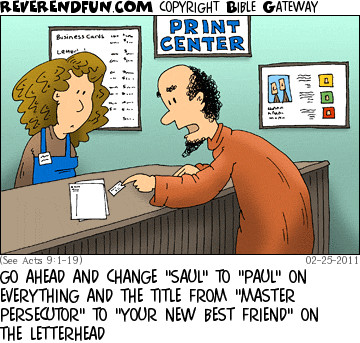




Do you agree that the only necessary condition for papal candidacy is for the person to be a baptized male Catholic?
Yes, this is the teaching of the Church, as Ecclesiastical Law cannot limit who may be elected, as history proves.

The Pope Speaks: June 2020
Obedience to the State

Saint Paul tells the Romans (13:1-5) "Let every soul be subject to higher powers: for there is no power but from God: and those that are, are ordained of God. Therefore he that resisteth the power, resisteth the ordinance of God. And they that resist, purchase to themselves damnation. For princes are not a terror to the good work, but to the evil. Wilt thou then not be afraid of the power? Do that which is good: and thou shalt have praise from the same. For he is God's minister to thee, for good. But if thou do that which is evil, fear: for he beareth not the sword in vain. For he is God's minister: an avenger to execute wrath upon him that doth evil. Wherefore be subject of necessity, not only for wrath, but also for conscience' sake."
All authority comes from Almighty God, including that of the State. There is a false idea, which underlied the Constitutional system in the early days. Some believed that the people themselves are sovereign and they grant authority to the government through the ballot box. However, this is a false idea. When we vote and someone is elected, the authority comes from God in the same way it does in a Papal Election. The electors elect a Catholic man to be Pope. The moment he accepts the election God grants him the power. Election is an act of inferiors electing a superior to be over them.
Saint Peter (I Peter 2:13-15) tells us: "Be ye subject therefore to every human creature for God's sake: whether it be to the king as excelling; Or to governors as sent by him for the punishment of evildoers, and for the praise of the good: For so is the will of God, that by doing well you may put to silence the ignorance of foolish men:" It is the will of God we obey all God has placed in authority over us. When we advocate disobedience or even disobey, we give others a bad example.
Proverbs (8:15-16) tells us: "By me kings reign, and lawgivers decree just things, By me princes rule, and the mighty decree justice." Many today are questioning the justice of the rulers of the State. There is a saying, we get the government we deserve. If we want justice, we must deserve justice by our way of life.
The principle of obedience binds in all places where it exists. Not just the Church and State, but also in the work place within the bounds of the manager's authority. There may be limits to authority, but it is not the inferior's place to judge. We owe not only obedience, but also respect to the authorities God has placed over us, even the evil ones. It is not our place to judge the actions of our superiors.
Jesus tells us how to deal with problems: "But if thy brother shall offend against thee, go, and rebuke him between thee and him alone. If he shall hear thee, thou shalt gain thy brother. And if he will not hear thee, take with thee one or two more: that in the mouth of two or three witnesses every word may stand. And if he will not hear them: tell the church. And if he will not hear the church, let him be to thee as the heathen and publican." (Matthew 18:15-17) If we have a problem with a superior, let us go to him and present it. If he will not hear us, then we may take one or two more. In the case of the State there is a procedure for addressing a problem, when the superior, such as President or Governor exceed their authority. We should use this procedure through the courts rather than start complaining to the world about what we believe these superiors are doing wrong. When they come up for re-election, we can vote against them.
The principle of obedience is simple, obey in all things except what is certainly sinful. A doubtful case is ruled in favor of the superior, and the superior is responsible before God.
One thing is being missed by those who complain about the evils in the world today. Cajetan wrote about what to do about an evil Pope. (By evil Pope, we mean morals, not heresy.) His answer is that our only solution is to have recourse to prayer. Do we pray for our superiors as we ought? The Church and the world run on prayer. The more sincere prayer, the better things will be. For prayer to be sincere it must come from a pure heart. Just as our superiors have a duty to pray for us, we have a duty to pray for them. In the Church we may know we have a duty to pray for our Pastor, our own Bishop and the Pope. However, we also have a duty to pray for our secular leaders, who God has placed over us. Also we have a duty to pray for our employer.
Saint John (9:31) tells us: "Now we know that God doth not hear sinners: but if a man be a server of God, and doth his will, him he heareth." While we nourish our pet sins, our prayers will not be heard. And one of these sins is ranting and raving about the sins of others and the evils in the world. Instead let us look at the evil in our own heart and ask God to purify our heart. If you truly want an end to evil in the world, let it end first in your own heart and soul. When we nourish our pet sins, no matter how trivial they may seem, we contribute to and increase the evil in the world.
When we do speak out, let us encourage each other to become saints, because this is our vocation. All of us are called to be saints. True, we may never be canonized. A true saint wants to become a saint unnoticed. A true saint lives by the Gospels and is truly humble, as Jesus said: "Take up my yoke upon you, and learn of me, because I am meek, and humble of heart: and you shall find rest to your souls." (Matthew 11:29)
A true saint also is an good example of obedience in all save sin. A true saint encourages others to obey.
Let us remember that those in authority receive their power from God. They have difficult decisions to make in some cases, and it is possible for them to err. In these days some may have erred simply because of the information they had available to them at the time they made their decision. We live in uncertain times, and rulers are going to make mistakes. Instead of criticizing them, let us support them and pray for them.
Saint Paul tells the Ephesians (4:29): "Let no evil speech proceed from your mouth; but that which is good, to the edification of faith, that it may administer grace to the hearers." My friends there is far too much evil speech today, when there should be none. Jesus says: "But let your speech be yea, yea: no, no: and that which is over and above these, is of evil." (Matthew 5:37)
Prayer for Government Leaders
God of power and might, wisdom and justice, through you authority is rightly administered, laws are enacted, and judgment is decreed. Assist with your spirit of counsel and fortitude the President and other government leaders of these United States. May they always seek the ways of righteousness, justice and mercy. Grant that they may be enabled by your powerful protection to lead our country with honesty and integrity. We ask this through Christ our Lord.


Saint John Cassian
On The Eight Vices
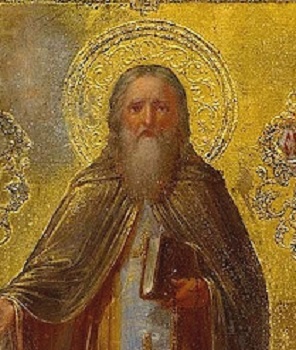
On Pride
Our eighth struggle is against the demon of pride, a most sinister demon, fiercer than all that have been discussed up till now. He attacks the perfect above all and seeks to destroy those who have mounted almost to the heights of holiness. Just as a deadly plague destroys not just one member of the body, but the whole of it, so pride corrupts the whole soul, not just part of it. Each of the other passions that trouble the soul attacks and tries to overcome the single virtue which is opposed to it, and so it darkens and troubles the soul only partially. But the passion of pride darkens the soul completely and leads to its utter downfall.
In order to understand more fully what is meant by this, we should look at the problem in the following way.
Gluttony tries to destroy self-control; unchastity, moderation; avarice, voluntary poverty; anger, gentleness; and the other forms of vice, their corresponding virtues. But when the vice of pride has become master of our wretched soul, it acts like some harsh tyrant who has gained control of a great city, and destroys it completely, razing it to its foundations. The angel who fell from heaven because of his pride bears witness to this. He had been created by God and adorned with every virtue and all wisdom, but he did not want to ascribe this to the grace of the Lord. He ascribed it to his own nature and as a result regarded himself as equal to God. The prophet rebukes this claim when he says: "You have said in your heart: 'I will sit on a high mountain; I will place my throne upon the clouds and I will be like the Most High.' Yet you are a man, and not God." (cf. Isa. 14:13-14) And again, another prophet says, "Why do you boast of your wickedness, O mighty man?" and he continues in this same vein (Ps. 52:1). Since we are aware of this we should feel fear and guard our hearts with extreme care from the deadly spirit of pride. When we have attained some degree of holiness we should always repeat to ourselves the words of the Apostle: "Yet not I, but the grace of God which was with me," (I Cor. 15:10) as well as what was said by the Lord: "Without Me you can do nothing." (John 15:5) We should also bear in mind what the prophet said: "Unless the Lord builds the house, they labor in vain that build it," (Ps. 127:1) and finally: "It does not depend on-man's will or effort, but on God's mercy." (Rom. 9:16)
Even if someone is sedulous, serious, and resolute, he cannot, so long as he is bound to flesh and blood, approach perfection except through the mercy and grace of Christ. James himself says that "every good gift is from above," (Jas. 1:17) while the Apostle Paul asks: "What do you have which you did not receive? Now if you received it, why do you boast, as if you had not received it?" (I Cor. 4:7) What right, then, has man to be proud as though he could achieve perfection through his own efforts?
The thief who received the kingdom of heaven, though not as the reward of virtue, is a true witness to the fact that salvation is ours through the grace and mercy of God. All of our holy fathers knew this and all with one accord teach that perfection in holiness can be achieved only through humility. Humility, in its turn, can be achieved only through faith, fear of God, gentleness, and the shedding of all possessions. It is by means of these that we attain perfect love, through the grace and compassion of our Lord Jesus Christ, to whom be glory through all the ages. Amen.

Saints from East and West
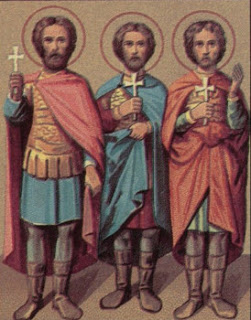
June 17 - The Holy Martyrs Manuel, Sabel, and Ishmael.
The Holy Martyrs Manuel, Sabel, and Ishmael, brothers by birth, were descended from an illustrious Persian lineage. Their father was a pagan, but their mother was a Christian, who baptised the children and raised them with firm faith in Christ the Saviour. Having grown into adults, the brothers entered military service. Speaking on behalf of the Persian emperor Alamundar, they were his emissaries in the concluding of a peace treaty with the emperor Julian the Apostate (361-363). Julian received them with due honour and showed them his favour. But when the brothers refused to take part in a pagan sacrificial offering, Julian became angry, and annulling the treaty, he locked up the peace emissaries of a foreign country in prison, like common criminals. At the interrogation he told them that if they scorned the gods worshipped by him, it would be impossible to reach any peace or accord between the two sides. The holy brothers answered that they were sent as emissaries of their emperor on matters of state, and not arguments about gods. Seeing the firmness of faith of the holy brothers, the emperor gave orders to subject them to fierce tortures. They suspended the holy martyrs, having nailed their hands and feet to wood, at their heads they thrust nails, and under their fingernails and toenails they wedged sharp needles. During this time of torment the saints, as though not feeling the tortures, glorified God and prayed. Finally, they beheaded they holy martyrs. Julian ordered their bodies to be burned. But suddenly there occurred an earthquake, and the ground opened up and took the bodies of the holy martyrs into its bosom. After two days, following upon the fervent prayers of Christians, the earth returned the bodies of the holy brothers, from which issued forth a fragrance. Many pagans, having witnessed the miracle, came to believe in Christ and were baptised. Christians reverently buried the bodies of the holy Martyrs Manuel, Sabel, and Ishmael. This occurred in the year 362. And since that time the relics of the holy passion-bearers have been glorified with wonderworking.
Having learned about the murder of his emissaries, and that the law-transgressor Julian was marching against him with a numerous army, the Persian emperor Alamundar gathered up his army and started off towards the border of his domain. In a large battle the Persians vanquished the Greeks. Julian the Apostate was killed by the holy Great Martyr Mercurius.
Thirty years later the pious emperor Theodosius the Great (+397) built at Constantinople a church in honour of the holy martyrs, and Sainted Germanos, Patriarch of Constantinople, then still a priestmonk, wrote a canon in memory and in praise of the holy brothers.

June 10 - Blessed Henry of Treviso.
Henry of Treviso, or San Rigo as he is often called in Italy, was born at Bolzano in the Trentino. His parents were very poor, and he never learned to read or write.He went as a young man to Treviso, where he supported himself as a day labourer, secretly giving away to the poor whatever he could save from his scanty wages.
Throughout his whole life his one object was the service of God. He heard Mass daily, frequently making his Communion, and every day he went to confession - not from scrupulosity, but to preserve the utmost purity of conscience. All the time that was not employed in labour and in necessary duties he spent in devotion, either at church or in private; the penitential instruments he used for the discipline of his body were preserved after his death in the cathedral. Men marvelled at his extraordinary equanimity, which nothing could ever ruffle. Foolish people and children sometimes mocked the shabby, thick-set little man, with his sunken eyes, long nose, and crooked mouth, but he never resented their treatment or replied to it, except to pray for them.
When he could no longer work, a citizen called James Castagnolis gave him a room in his house and, when necessary, food. Usually, however, Blessed Henry subsisted on the alms of the charitable, which he shared with beggars, never holding anything over from one day to the next. Even extreme bodily weakness in advancing age could not keep him from God's house and from visiting all the churches within walking distance of Treviso.
He died on June 10, 1315. His little room was immediately thronged with visitors eager to venerate him and to secure some fragment of his possessions, which consisted of a hair-shirt, a wooden log which had been his pillow, and some cords and straw that had served as his bed.
Extraordinary scenes were witnessed after his body had been removed to the cathedral. The people broke into the basilica at night, and the bishop and the podesta, roused from their sleep, were obliged to go and protect the body by putting a wooden palisade round it.
No fewer than 276 miracles, said to have been wrought by his relics, were recorded within a few days of Blessed Henry's death by the notaries appointed by the magistrates: they occupy thirty-two closely printed columns of the Acta Sanctorum. The cultus of Blessed Henry was confirmed by Pope Benedict XIV.


Books to feed your faith!
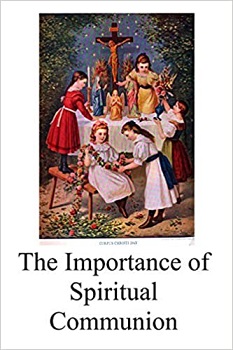
The Importance of Spiritual Communion
Kindle $2.99 / Paperback $5.99
If we cannot receive Holy Communion actually, then let us do so spiritually. These prayers and instructions have been gathered from the Saints and other venerated spiritual writers. Spiritual Communion has been a part of the spiritual life for decades. Growing up I was instructed to make a Spiritual Communion, when I could not go to Communion such as when I assisted at a second Mass. The same is true if one finds oneself at Mass, but not fasting. There are times coming, when it will be difficult, if not impossible to assist at the Holy Sacrifice of the Mass. We should be prepared for such times.

The Fruits of Devotion to the Sacred Heart: A Course of Sermons for the First Fridays of the Year
$9.95
Can we truly know God? asks the world doubtfully to-day. Can the great God love or care for us, as we understand the words? Or is there a man, sinless, unselfish, divine, with a mind and a heart like our own, to teach us the true knowledge and love of God? Is there, in this dark world of ours, a spring of light and love where all may drink and which will never run dry? Brethren, we If whose eyes have seen the King in his beauty" (Isa. xxxiii. 17) fearlessly answer " Yes." Such an one" was seen on earth, and conversed with men," and His" Sacred Heart" is the magic fountain that men crave for. Let us consider the beginning of the first sermon: “By the very nature of His being, God is beyond the comprehension of a creature. Finite mind at its highest, even with the joint light of nature, grace, and glory, can never fully grasp the infinite. It is the sole prerogative of the three divine Persons, to know adequately their own common nature and essence.” In another sermon we read: “Love of the Holy Ghost was a permanent feature of the spirit of Jesus; and is, therefore, intimately linked with devotion to the Sacred Heart. Love and fire are symbols of the heart as they are of the Holy Ghost. Indeed, the Holy Ghost is love in the full limitless sense of the term, the eternal, substantial, mutual love of father and son. We are taught by the Sacred Heart to look up to the Father with filial humility and dependence as Creator, Preserver and Last End; to seek in the Son the divine light, guiding us in reason and faith; but in the Holy Ghost the living fire came down from heaven, the love, the heartfelt enthusiasm that carries us irresistibly forward to virtue, good works, holiness.” Each sermon is divided into three sections, light, love and then duty. And in conclusion: “No more fitting conclusion than this to our thoughts on the fruits of devotion to the Sacred Heart. Briefly put, these fruits are light in the mind, love in the heart and firm purpose of will to carry out all resulting duties, that will make us not merely "hearers but doers of the Word." The main power of the soul are thus exercised and strengthened. The whole field of the soul is made fruitful in light and love, leading to duty in the three great relations of life, those bearing on God, our neighbor, and ourselves. Thus united to the Sacred Heart on earth, we may confidently hope one day to live united with it forever in heaven. For true lovers of the Sacred Heart the sixth beatitude is ever in the way of fulfillment: "Blessed are the clean of heart, for they shall see God."
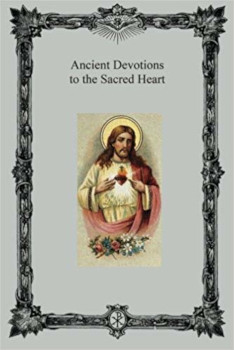
Ancient Devotions to the Sacred Heart
$15.95
When we think of devotion to the Sacred Heart, we think of Saint Margaret Mary. However, this devotion goes back further in history to Saint John Eudes, who wrote on the subject. And now we see that the Carthusians also were following this devotion before Saint Margaret Mary. A glance at these pages will show how justified was Dom Le Masson in claiming that the devotion revealed to St. Margaret Mary and made popular by her effotts was already an old one in the Carthusian Order. Dom Cyprien, before re-editing Dom Le Masson's work, had already written on Lansperge the Carthusian and Devotion to the Sacred Heart. Lansperge had, in fact, a special part in the propagation of the Devotion in the sixteenth century: but he only developed what was a tradition of long standing in his Order. Ludolph the Carthusian had already written before the middle of the fourteenth century in his Life of Christ those words which have been chosen for the opening pages of our present anthology; and from that time on the tradition remained unbroken. Nor was it confined to one Charterhouse, or to one Province of the Order. It is not surprising that many of the writers whose works are quoted belonged to the Rhineland Province, for the Charterhouse of Cologne, which had the reputation of displaying the greatest love for learning of all the Houses of the Order, had a marked influence on the Province. But the pen was not the only instrument used for spreading the Devotion. Not content with writing about the Devotion to the Heart of Jesus, these apostles of love contrived to engrave Its image on the very walls of stone with which their Monasteries were built. The escutcheon reproduced as a frontispiece is worthy of partic'llar notice. It forms the key-stone of an arch at the Grande Chartreuse in that part of the old cloister which was built after the fire of 1473. A cross is seen rising out of a tomb, with the three nails, the rod and the sponge on a reed on the right, and on the left three dice, pincers and hammer, and a scourge. Above are the thirty pieces of silver, and the crown of thorns is hanging on the right arm of the cross. These arms of the Passion are common enough: what is exceptional in the shield of the Grande Chartreuse is the heart in the centre of the cross, with a large wound entirely penetrated by a lance. This has been reckoned as the oldest known carving of the Sacred Heart of Jesus. This work consists of thirty elevations to the Sacred Heart followed by a week devoted to the Sacred Heart. A section is devoted to prayers for all occasions, including preparation for death.
Charity: A Commentary on I Corinthians 13 by Saint Alphonsus
$9.99 paperback / $0.99 Kindle
Charity is patient, is kind: charity envieth not, dealeth not perversely; is not puffed up; Is not ambitious, seeketh not her own, is not provoked to anger, thinketh no evil; Rejoiceth not in iniquity, but rejoiceth with the truth; Beareth all things, believeth all things, hopeth all things, endureth all things. (I Corinthians 13:4-7) Saint Paul wrote wonderfully about charity in the 13th chapter of First Corinthians. Saint Alphonsus takes these words and gives a simple view of the Catholic way of life and an excellent introduction into the spiritual life. This is excerpted from his work, The Holy Eucharist, which has been excerpted from The Complete Works of Saint Alphonsus, which was compiled and translated by Father Eugene Grimm. (1835-1891)
For More Good Traditional Catholic Books:


Fire and Ice Salad

Ingredients
6 large tomatoes, peeled and quartered
1 green bell pepper, sliced in rings
1 red onion, sliced in rings
3/4 cup white wine vinegar
1 1/2 teaspoons celery salt
1 1/2 teaspoons mustard seed
4 1/2 teaspoons white sugar
1/8 teaspoon cayenne pepper
1/8 teaspoon ground black pepper
1/4 cup water
1 large cucumber
Directions
In a large bowl, combine the tomatoes, bell peppers and onions.
Prepare the dressing in a saucepan by combining the vinegar, celery salt, mustard seed, sugar, cayenne pepper, black pepper and water.
Boil for 1 minute and pour hot dressing over vegetables.
Refrigerate until chilled.
Before serving, peel and slice cucumber; add to vegetables and toss.
Simple Country Ribs

Ingredients
2 1/2 pounds pork spareribs
2 (18 ounce) bottles barbeque sauce
1 onion, quartered
1 teaspoon salt
1/2 teaspoon ground black pepper
Directions
Place spareribs in a large stock pot with barbeque sauce, onion, salt, and pepper.
Pour in enough water to cover.
Bring to a low boil, and cook approximately 40 minutes.
Preheat grill for high heat.
Lightly oil grate.
Remove spareribs from the stock pot, and place on the prepared grill.
Use the barbecue sauce in the saucepan to baste ribs while cooking.
Grill ribs, basting and turning frequently, for 20 minutes, or until nicely browned.

Video sermons and instructions: Timeless timely truths for living the Faith
Pentecost 2011
Pentecost 2012
Trinity Sunday 2013
Sacred Moments - Trust And Obey

Encouragement for Today
Therefore encourage one another and build one another up.... I Thessalonians 5:11
We believe...
that through our assorted podcasts, audio downloads and devotional blogs, you will find an assorted Treasure Chest of...
Sermons
Devotionals
Scripture Studies
Catechism Lessons
Daily Blogs
...that will be a help in your faithful walk with the Lord.
LEARN MORE AT THE ENCOURAGEMENT FOR TODAY WEBSITE: https://www.encouragementfortoday.com
More Butterfly Colors than You Can See

“One thing I have asked of the Lord, this will I seek after; that I may dwell in the house of the Lord all the days of my life. That I may see the delight of the Lord, and may visit his temple.”
Psalm 27:4.
The beautiful wing of the butterfly has a lesson to teach everyone who believes living things were created by chance. The design of the butterfly wing involves much more than just intricate complexity. In addition to showing a knowledge of flight, each wing design is the product of very precise specifications built around the specific wave-lengths of visible light.
The iridescent colors you admire on a butterfly’s wing are created by the scales of the wings. Each square centimeter of wing has tens of thousands of these scales, each attached to the wing by tiny stems and overlapping each other like cedar shakes. Each one of these scales was a living cell until a day or two before the butterfly emerged from its pupa. Each tiny scale is made of a vertical and horizontal framing within which are found various sacks of pigment hanging from the framework.
Butterfly wings that seem to glow with iridescent blues and greens have scales with tiny lattices and ribbed walls that are designed to cause interference patterns in light waves within the 300-700 nanometer range—exactly the range humans see as color. That interference pattern is what our eyes interpret as iridescence.
It takes a good knowledge of physics as well as micro-architecture to design and build an iridescent butterfly wing! Science clearly teaches us that such ability and knowledge does not come from chance. Let’s be bold to admit the truth—there is a Creator!.

Catechism Catch-Up
The Third Commandment Lesson 7

The Sabbath in the Gospels and Acts
We will look at the Sabbath controversies in the Gospels to see how the Gospel writers portrayed Jesus in reference to the Sabbath. We will examine these texts to see whether Jesus is shown to have broken the Sabbath command as given in the Torah or whether he simply broke the halakic interpretations of the Sabbath.
The Halakah was developed to guide the Jews in areas where the scriptural text was not explicit. The Halakah began to be developed after the Exile in the closing days of the prophetic movement. With the lack of an authoritative word from God, the Jews could not always determine God’s will on the basis of scriptural text alone. Thus, a need existed to interpret and apply the past revelation of God’s will in various situations that confronted the Jewish community. As the process continued, the oral decisions of generations of Jewish teachers were codified,(that is arranged in to a system of laws and rules), in the Mishnah.
Definition of Mishnah: An authoritative collection of exegetical material embodying the oral tradition of Jewish law and forming the first part of the Talmud.
Definition of Talmud: The collection of Jewish law and tradition consisting of the Mishnah and the Gemara
Definition of Gemara: A rabbinical commentary on the Mishnah, forming the second part of the Talmud.
Definition of Torah: The law of God as revealed to Moses and recorded in the first five books of the Hebrew scriptures.
The Torah was not explicit in many areas, especially when dealing with Sabbath observance. Scripture gave little detailed guidance of how to keep the Sabbath, and a substantial body of tradition developed that showed the Jews what they could do and could not do on the Sabbath.
Sabbath controversies in Mark
(Mark 2:23-28)
And it came to pass again, as the Lord walked through the corn fields on the Sabbath, that his disciples began to go forward, and to pluck the ears of corn.
24 And the Pharisees said to him: Behold, why do they on the Sabbath day that which is not lawful?
25 And he said to them: Have you never read what David did when he had need, and was hungry himself, and they that were with him?
26 How he went into the house of God, under Abiathar the high priest, and did eat the loaves of shewbread, which was not lawful to eat but for the priests, and gave to them who were with him?
27 And he said to them: The Sabbath was made for man, and not man for the Sabbath.
28 Therefore the Son of man is Lord of the Sabbath also.
In the last part of this chapter we come to a Sabbath Saturday in the fields. Then in chapter three it begins with the Sabbath Saturday inside the synagogue. We see these two incidents in Matthew and in Luke. It is very important because it was on this question of the Sabbath Saturday that He broke with the religious rulers. From this time on, they sought His death.
He claims in this incident that He is the Lord of the Sabbath day. The question of course, arises: did he really break the Sabbath in either instance? When He healed the poor man with the withered hand in Mark chapter 3, did he break the Sabbath law? Absolutely he did not. He came to fulfill the Law.
(Matthew 5:17)
Do not think that I am come to destroy the law, or the prophets. I am not come to destroy, but to fulfill.
But here we find that he is giving an interpretation of this. He reveals that that He, as the Son of Man, is the Lord of the Sabbath day, and he had authority from His father to interpret the Law.
During his life, Christ interpreted the law, as in the case of the disciples picking grain (Mark 2:23-28) ,and the man with the withered hand . He exercised this power this authority, in his human capacity as the Messiah or Son of man, telling us, "the Son of man is Lord of the sabbath" (Mark 2:28), which is why Saint Matthew himself explains that God "had given such power to men"(Matthew 9:8).
Since he would not always be with the Church visibly, Christ gave this power to other men so the Church, which is the continuation of his presence throughout time (Matthew 28:20), would be able to interpret and apply rules about the Sabbath day as well which day should be our Sabbath day, to future generations. He gave his power to the apostles, and it was a power that could be passed on to their successors and agents, since the apostles wouldn’t always be on earth either, but people would still be sinning.
God had sent Jesus with the power and authority over the Sabbath day, but after his resurrection Jesus told the apostles, "He said therefore to them again: Peace be to you. As the Father hath sent me, I also send you. When he had said this, he breathed on them; and he said to them: Receive ye the Holy Ghost. (John 20:21–23).
The Commission
Christ told the apostles to follow his example: "As the Father hath sent me, I also send you." (John 20:21). Just as the apostles were to carry Christ’s message to the whole world, so they were to carry his that same message: "Amen I say to you, whatsoever you shall bind upon earth, shall be bound also in heaven; and whatsoever you shall loose upon earth, shall be loosed also in heaven." (Matthew 18:18).
This power was understood as coming from God: "But all things are of God, who hath reconciled us to himself by Christ; and hath given to us the ministry of reconciliation." (2 Corinthians 5:18). Indeed, confirms saint Paul, "We are Christ’s ambassadors" (2 Corinthians 5:20).
Some say that any power given to the apostles died with them. Not so. Some powers must have, such as the ability to write Scripture. But the powers necessary to maintain the Church as a living, spiritual society had to be passed down from generation to generation. If they ceased, the Church would cease, except as a quaint abstraction. Christ ordered the apostles to, "Going therefore, making disciples of all nations." It would take much time. And he promised them assistance: "behold I am with you all through the days that are coming, until the consummation of the world." (Matthew 28:19–20).
Now we turn our attention to how the Sabbath is mentioned in the book of Acts. The Sabbath is referred to in the following places in Acts.
Acts 1:12: “Then they returned to Jerusalem from the mount called Olivet, a Sabbath day’s journey away.”
Acts 13:27: For they that inhabited Jerusalem, and the rulers thereof, not knowing him, nor the voices of the prophets, which are read every Sabbath, judging him have fulfilled them.
Acts 13:42, 44: “And as they went out, they desired them, that on the next Sabbath, they would speak unto them…. The next Sabbath day, the whole city almost came together, to hear the word of God.”
Acts 15:21: “For Moses of old time hath in every city them that preach him in the synagogues, where he is read every Sabbath. ”
Acts 16:13: “And upon the Sabbath day, we went forth without the gate by a river side, where it seemed that there was prayer; and sitting down, we spoke to the women that were assembled.”
Acts 17:2: “And Paul, according to his custom, went in unto them; and for three Sabbath days he reasoned with them out of the scriptures:”
Acts 18:4: “And he,[Paul],reasoned in the synagogue every Sabbath, bringing in the name of the Lord Jesus; and he persuaded the Jews and the Greeks.”
Most of these scriptures show the apostles beginning to preach the gospel in the Jewish synagogues, both to the Jews and to Gentiles who had assembled there. It would have been natural for Jewish Christians to have remained in the synagogues until they were forced out, perhaps near the end of the first century.
Of interest here is the Jerusalem conference in Acts 15 about what was required of Gentile converts. Saturday Sabbath observance is not listed among the requirements for the Gentiles that the Jerusalem conference decided upon (Acts 15:20).
If the disciples believed that Christ instituted the power to be Lord of the Sabbath in his stead, we would expect the apostles’ successors—the bishops—and Christians of later years to act as though such power was legitimately and habitually exercised. If, on the other hand, being able to change the Sabbath from Saturday to Sunday based on the authority given to the Church over the Sabbath was what Fundamentalists term it, an "invention," and if it was something foisted upon the young Church by ecclesiastical or political leaders, we’d expect to find records of protest. In fact, in early Christian writings we find no sign of protests. Quite the contrary. We find Sabbath Sunday was accepted as part of the deposit of faith handed down from the apostles.
Quotes and Writings of the Early Fathers on the subject of The Sabbath:
225 AD The Didascalia - "On the first day of the week [Sunday] let there be service, and the reading of the Holy Scriptures, and the oblation [Sacrifice of the Mass], because on the first day of the week our Lord rose from the place of the dead, and on the first day of the week he arose upon the world, and on the first day of the week he ascended up to heaven, and on the first day of the week he will appear at last with the angels of heaven"
350 AD Apostolic Constitution: Be not careless of yourselves, neither deprive your Savior of His own members, neither divide His body nor disperse His members, neither prefer the occasions of this life to the word of God; but assemble yourselves together every day, morning and evening, singing psalms and praying in the Lord's house: in the morning saying the sixty-second Psalm, and in the evening the hundred and fortieth, but principally on the Sabbath-day. And on the day of our Lord's resurrection, which is the Lord's day, meet more diligently, sending praise to God that made the universe by Jesus, and sent Him to us, and condescended to let Him suffer, and raised Him from the dead. Otherwise what apology will he make to God who does not assemble on that day to hear the saving word concerning the resurrection, on which we pray thrice standing in memory of Him who arose in three days, in which is performed the reading of the prophets, the preaching of the Gospel, the oblation of the sacrifice, the gift of the holy food?
The Epistle of Ignatius to the Magnesians 8-10 (c. 110 A.D.)
"Do not be deceived by strange doctrines or antiquated myths, since they are worthless. For if we continue to live accordance with Judaism, we admit that we have not received grace. For the most godly prophets lived in accordance with Christ Jesus. This is why they were persecuted, being inspired as they were by His grace in order that those who are disobedient might be fully convinced that there is one God who revealed Himself through Jesus Christ His Son, who is His Word which came forth from silence, who in every respect pleased Him who sent Him. If, then, those who had lived in antiquated practices came to newness of hope, no longer keeping the Sabbath but living in accordance with the Lord's day, on which our life also arose through Him and His death (which some deny), the mystery through which we came to believe, and because of which we patiently endure, in order that we might be found to be disciples of Jesus Christ, our only teacher, how can we possibly live without Him, whom even the prophets, who were His disciples in the Spirit, were expecting as their teacher? Because of this He for whom they rightly waited raised them from the dead when He came. Therefore let us not be unaware of His goodness. For if He were to imitate the way we act, we are lost. Therefore, having become His disciples, let us learn to live in accordance with Christianity. For whoever is called by any other name than this one does not belong to God. Throw out, therefore, the bad leaven, which has become stale and sour, and reach for the new leaven, which is Jesus Christ. Be salted with Him, so that none of you become rotten, for by your odor you will be examined. It is utterly absurd to profess Jesus Christ and to practice Judaism. For Christianity did not believe in Judaism, but Judaism in Christianity, in which "every tongue" believed and "was brought together" to God."
Epistle of Barnabas 15:8-9 (c. 130 A.D.)
"Finally, He says to them: 'I cannot bear your new moons and sabbaths.' You see what He means: it is not the present sabbaths that are acceptable to Me, but the one that I have made; on that Sabbath, after I have set everything at rest, I will create the beginning of an eighth day, which is the beginning of another world. This is why we spend the eighth day ( a reference to Sunday) in celebration, the day on which Jesus both arose from the dead and, after appearing again, ascended into heaven."
The Didache (or The Teaching of the Twelve Apostles) 14:1 (c. 70 A.D.)
"On the Lord's own day gather together and break bread and give thanks, having first confessed your sins so that your sacrifice may be pure."
Eusebius Ecclesiastical History, Book 3, Chapter 27 (c.315A.D.)
"The Ebionites cherished low and mean opinions of Christ. For they considered Him a plain and common man, and justified only by His advances in virtue, and that He was born of the Virgin Mary, by natural generation. With them the observance of the law was altogether necessary, as if they could not be saved, only by faith in Christ and a corresponding life. These, indeed, thought on the one hand that all of the epistles of the apostles ought to be rejected, calling him an apostate from the law, but on the other, only using the gospel according to the Hebrews, they esteem the others as of little value. They also observe the Sabbath and other discipline of the Jews, just like them, but on the other hand, they also celebrate the Lords days very much like us, in commemoration of His resurrection."
Irenaeus, Bishop of Lyons (c. 178 A.D.)
"The duty of celebrating the mystery of the resurrection of our Lord may be done only on the day of the Lord."
The First Apology of Justin, Chapter 67
"And on the day called Sunday, all who live in cities or in the country gather together to one place, and the memoirs of the apostles or the writings of the prophets are read, as long as time permits; then, when the reader has ceased, the president verbally instructs, and exhorts to the imitation of these good things ... But Sunday is the day on which we all hold our common assembly, because it is the first day on which God, having wrought a change in the darkness and matter, made the world; and Jesus Christ our Savior on the same day rose from the dead."
Next:
The Church's teaching on how we should fulfill our Sabbath Sunday obligations.
Living Catholic:
Why should I bless those who curse me?

When we experience abuse from others, our natural response is to strike back. Pride prompts us to return hurt for hurt and insult for insult. However, God instructs us to love our enemies: “You have heard that it hath been said, Thou shalt love thy neighbour, and hate thy enemy. But I say to you, Love your enemies: do good to them that hate you: and pray for them that persecute and calumniate you:” (Matthew 5:43-44; see also Luke 6:27-29).
When Scripture speaks of blessing those who curse us, this cursing can include insults, reproaches, and verbal offenses of all kinds. Many people struggle for weeks, months, or even years as a result of wounds caused by curses.
A Blessing Can Break the Bondage of a Curse
Once a young woman was deeply offended when her supervisor criticized and belittled her. She could not forget her supervisor’s stinging words, and she became increasingly bitter and angry as time passed. She testified, “I carried that hurt to college, and without knowing it I was in bondage to a curse. . . . I started struggling in school and failed three exams in a row. I had never had problems with school before. I then became consumed with my studies so I would not fail any more exams.
“I lost my focus so that God was not number one in my life. I had sacrificed my relationships with people and ultimately my time with the Lord by working on projects and my studies. . . . One day when I was on summer break, the Lord really spoke to me. I realized that I could not honestly say that I loved the Lord with all of my heart, soul, mind, and strength.”
At about the same time, this student heard a message about the value of blessing those who curse us. She later testified, “I went into my room and closed the door . . . I cried out to God to bless me, and I asked Him to bless my former supervisor and his family. Instantly I felt as if chains had been lifted off of me. I felt an incredible freedom that I had not experienced before. . . . The joy that I now feel is overwhelming. . . .”
Bless Those Who Revile You
One of the Biblical terms for someone who speaks abusive words is reviler. Reviling comes from a heart of scorn and contempt and is a means of verbally attacking a person as an expression of anger and hatred. A reviler intends to vilify, to defame, to bring shame, to discredit, or to attribute evil motives to another.
Ridicule is one aspect of reviling. To ridicule is to hold up a person or his ideas to laughter—to sneer, scoff, and belittle a person. Giving someone an insulting or demeaning label is a common method of ridicule. Reviling is a form of railing upon a person.
God’s Word condemns reviling. The Apostle Paul instructed the Corinthian believers not to keep company with a believer who was a reviler (see I Corinthians 5:11), and he also said that revilers are among those who will not inherit the kingdom of God (see I Corinthians 6:9-10).
Jesus was reviled. Immediately prior to His crucifixion, Roman soldiers not only scourged Him; they mocked and belittled Him as well. (See Matthew 27:26-31.) While Christ was on the cross, "They that passed by, blasphemed him, wagging their heads, And saying: Thou that destroyest the temple of God, and in three days dost rebuild it: save thy own self: if thou be the Son of God, come down from the cross." "In like manner also the chief priests, with the scribes and ancients, mocking, said: He saved others; himself he cannot save. If he be the king of Israel, let him now come down from the cross, and we will believe him. He trusted in God; let him now deliver him if he will have him; for he said: I am the Son of God. And the selfsame thing the thieves also, that were crucified with him, reproached him with. (Matthew 27:39-44). Yet, even while He was suffering the horrors of crucifixion, Jesus blessed His persecutors, saying, “Father, forgive them, for they know not what they do. But they, dividing his garments, cast lots.” (Luke 23:34).
Follow the Lord’s Example
Jesus set the example that we are to follow, returning blessing for cursing and committing Himself into His heavenly Father’s care. (See I Peter 2:21.) “Who, when he was reviled, did not revile: when he suffered, he threatened not: but delivered himself to him that judged him justly.” (I Peter 2:23).
If we bless those who hurt us, God will take full responsibility for whatever punishment should be administered to offenders. It is our responsibility to overcome evil with good, and speaking words of blessing is one way to do that.
The Apostle Peter specifically addresses the need to bless those who revile us: “. . .Not rendering evil for evil, nor railing for railing, but contrariwise, blessing: for unto this are you called, that you may inherit a blessing. For he that will love life, and see good days, let him refrain his tongue from evil, and his lips that they speak no guile. Let him decline from evil, and do good: let him seek after peace and pursue it: Because the eyes of the Lord are upon the just, and his ears unto their prayers: but the countenance of the Lord upon them that do evil things.” (I Peter 3: 9-12).
The Apostle Paul gave this instruction to the believers in Rome: “Bless them that persecute you: bless, and curse not. . . . Revenge not yourselves. . . . . . . Vengeance is mine; I will repay, saith the Lord. Therefore if thine enemy hunger, feed him; if he thirst, give him drink . . . . Be not overcome of evil, but overcome evil with good” (Romans 12:14, 17, 19-21).
Receive the Rewards of Blessing a Reviler
Freedom from an emotional, often vengeful, reaction and genuine love for an offender are the immediate rewards of blessing a reviler. When a person is reviled, the resulting anguish can easily develop into emotional grief and bitterness. However, if by faith that person chooses to bless his offender, rather than curse him, evil will effectively be overcome with good.
Resolve Long-Term Bitterness
Many people have testified to overcoming years of bitterness that began when they were cursed or abused during childhood. As these abused individuals blessed their offenders, often their bitterness disappeared immediately.
But how are you to deal with bitterness toward someone on whom you no longer have the opportunity to bestow a blessing, such as someone who has died since the offense occurred?
- Put your faith in God and His love for both you and the offender.
- Thank God for His power to redeem those hurtful circumstances and memories.
- Ask Him to give you wisdom and grace to forgive and release your offender from your bitterness and condemnation, even though the person may be dead already. You are still living, and you can still make choices that bring freedom and blessing to your life as you choose to forgive and bless instead of be bitter and curse. (See James 1:5, John 16:23, II Peter 1:2, Hebrews 4:16, and James 4:6.)
Love Your Enemies, Because That Is God’s Will
Apart from God’s marvelous grace, you will be unable to bless those who curse you, but with God, nothing is impossible. Jesus said, “And as you would that men should do to you, do you also to them in like manner. And if you love them that love you, what thanks are to you? for sinners also love those that love them. And if you do good to them who do good to you, what thanks are to you? for sinners also do this. And if you lend to them of whom you hope to receive, what thanks are to you? for sinners also lend to sinners, for to receive as much. But love ye your enemies: do good, and lend, hoping for nothing thereby: and your reward shall be great, and you shall be the sons of the Highest; for he is kind to the unthankful, and to the evil. Be ye therefore merciful, as your Father also is merciful.” (Luke 6:31-36).
To Learn More Principles For Life Go To: Resources: Principles of Life

Pray for the Holy Father! Pray with the Holy Father!
-
Your prayers are asked this month and every month for the intentions of the Holy Father, Pope Michael
- Pray especially that Holy Ghost inspires and helps us prepare spiritual manuals and days of recollection to make available to all.
-
Keep in your prayers our Podcast Ministry, a new way to reach out in the missionary work of the Church! We ask for prayers for our other activities world wide. We have made good contacts in the Philippines and Japan and ask prayers that these contacts will bear much fruit for the salvation of souls.
-
Be sure to keep St. Helen Catholic Mission in your prayers. Why not go on over to the site now and see what they have to offer and how you might be able to help!
-
Also we ask you to keep in prayer our increasing missionary work in the United States and elsewhere.
-
Your prayers are asked for Father Francis Dominic as he begins a new work in Kissimmee Florida that has been entrusted to him within the Church.
-
Pray for those outside the Church and those who do not know God, that they may see the light of grace and be led safely home to the refuge of the Holy Catholic Church.
-
As always, we also ask that you pray for yourself! Never forget your own state of soul. God is calling you to His service in His love. We know that our Lord can count on you to answer.
-
We are all praying especially for you, too. May you correspond with every grace of God!
-
In what other needs or intentions may we pray for you? Let us know!
-
Let us remember that the Church runs on prayer. Without your prayers, God will not work in hearts and souls to bring them to a knowledge of the truth. (I Timothy 2:4)



To Donate by Mail:
Our address is
Vatican in Exile
829 NE Chester
Topeka, Kansas 66616
Make Checks payable to:
Vatican in Exile

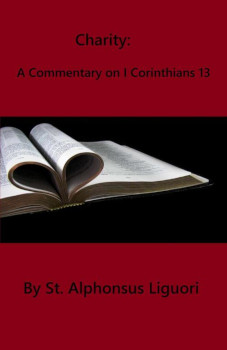








 Follow
Follow


